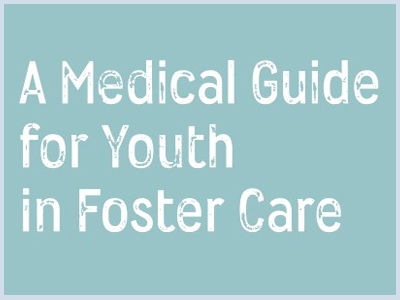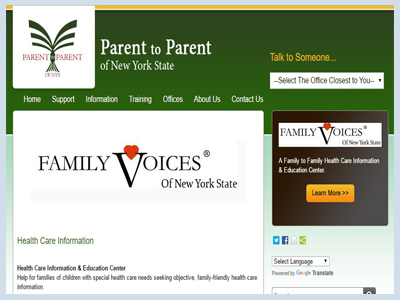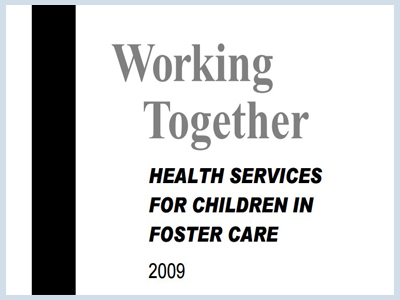Health Care Advocacy
Health Services Advocacy is a must learn skill for foster and adoptive parents caring for children frequently enmeshed in multiple systems of care. Based on the understanding that anything we accomplish happens because of good communication, the following resources offer information and strategies parents can use to effectively advocate with health care professionals.
Foster and adoptive parents can be a critical advocacy force to ensure that children in foster care receive services to enhance their healthy development and prospects for permanency. Research nationwide confirms what foster and adoptive parents have long known — children in foster care are likely to have serious unmet health problems, developmental delays and disabilities. These health problems often are ignored despite federal and state laws guaranteeing that they be addressed. Young children in foster care often are not connected to critical programs that can address or ameliorate their delays. All too often, those involved in the court process focus on children’s safety, overlooking the critical link between safety, health and permanency. Yet, inattention to the health and development needs of children in foster care compromises their healthy development and undermines permanency efforts.
Legal Entitlements
For families caring for children involved in the child welfare system, the presence of medical conditions or disability can jeopardize family stability as well as undermine efforts to recruit and retain adoptive parents. The lack of attention to the health needs of children in foster care and the gaps in services is particularly disturbing because they have a legal entitlement to receive health care under federal and State Medicaid and EPSDT law. Research nationwide reveals that half of all young children in foster care also are eligible to receive Early Intervention Program services for infants and toddlers who have a developmental delay or a condition with a high probability of resulting in developmental delay. Many of these children also can participate in early childhood programs such as Early Head Start and Head Start.
The Permanent Judicial Commission on Justice for Children, a multidisciplinary Commission chaired by New York State’s Chief Judge, Judith Kaye, and the nation’s only children’s Commission based in the judiciary, has developed a multi-pronged strategy to assist all those involved in the child welfare and court systems in identifying and addressing the health needs of children in foster care. The centerpiece of this strategy is our booklet, Ensuring the Healthy Development of Foster Children: A Guide for Judges, Advocates and Child Welfare Professionals, that provides ten questions to identify a foster child’s health needs and gaps in services. Judges and lawyers throughout New York State are using the checklist at the earliest possible point to identify health needs and to shape permanency planning.
The Healthy Development Checklist can be an important tool for foster and adoptive parents. Since they often do not receive complete information about a child’s needs, asking these questions can highlight health problems and disabilities. Foster and adoptive parents should ask caseworkers about the result of the required comprehensive assessment which must address questions one through eight in the Checklist and learn about recommendations for follow-up treatment. Adoptive parents should ensure that caseworkers provide them with medical histories for the child and assistance in continuing necessary services such as Early Intervention once the child leaves foster care. Foster parents should share information they have about a child’s health and development with the court. They can work with the child’s health care provider and other professionals providing services to the child to bring information about the child’s needs and treatment plan to the attention of the law guardian.
Advocacy Strategies For Foster and Adoptive Parents
To ensure that children receive the services they need, foster and adoptive parents can refer every child under three with a suspected disability or developmental delay to the Early Intervention program for assessment. (They also can refer children to Early Head Start, Head Start and other quality early childhood programs.) While, at every juncture in the Early Intervention process; evaluation, service planning and provision of services; the child’s parent is required to give his or her consent, the federal Early Intervention and special education laws have a very broad definition of parent. The federal law permits States to allow a foster parent to act as a parent when the biological parent’s authority to make educational decisions has been extinguished and the foster parent has established a long-term stable relationship with the child. Unfortunately, New York State Early Intervention law does not include foster parents in its definition of “parent.” Yet, the Early Intervention and special education laws provide for the appointment of a surrogate parent if there is no parent as broadly defined to act on behalf of the eligible child. A foster parent can serve as the surrogate parent.
Foster and adoptive parents also can serve as an advocacy force in shaping policy that places children in foster care on the radar screen of programs serving vulnerable children. On a statewide level, foster parent associations can speak to State and local officials about the health needs of foster children and gaps in services. They can spotlight the ASFA provisions that require States to ensure that children receive services to meet their educational, physical and mental health needs and that families have enhanced capacity to provide for their children’s needs. They also can meet with their local Early Intervention Official, local Early Intervention Coordinating Council and Head Start program providers to ensure that children in foster care are included in recruitment and program planning efforts. Additionally, they can advocate for the inclusion of “foster parent” in the definition of “parent” under New York Early Intervention and special education laws.
Permanent Judicial Commission on Justice for Children Healthy Development Checklist
- Has the child received a comprehensive health assessment since entering foster care?
- Are the child’s immunizations complete and up-to-date for his or her age?
- Has the child received hearing and vision screening?
- Has the child received screening for lead exposure?
- Has the child received regular dental services?
- Has the child received screening for communicable diseases?
- Has the child received a developmental screening by a provider with experience in child development?
- Has the child received mental health screening?
- Is the child enrolled in an early childhood program?
- Has the adolescent child received information about healthy development?
Source: by Sheryl Dicker and Elysa Gordon. Sheryl Dicker is the former Executive Director of the Permanent Judicial Commission on Justice for Children. Elysa Gordon is the Commission’s Senior Policy Analyst. For copies of the Permanent Judicial Commission on Justice for Children’s booklet and other publications please contact, 140 Grand Street, Suite 404, White Plains, N.Y. 10601. Reprinted from “The Coalition Voice,” Spring 2001
More Information and Resources:
A Medical Guide for Youth in Foster Care
It can be really challenging when you’re in foster care, because there are laws and regulations that apply specifically to you. They affect who can give permission for your health care, the services and treatments you receive, and who pays for them.
Parent to Parent New York Health Care Information and Education Center
Parent to Parent of New York State builds a supportive network of families to reduce isolation and empower those who care for people with developmental disabilities or special healthcare needs to navigate and influence service systems and make informed decisions.
Working Together: Health Services for Children In Foster Care
This manual is designed to support foster care and health services staff in focusing attention on the critical issue of adequate, timely health services for children in foster care.



